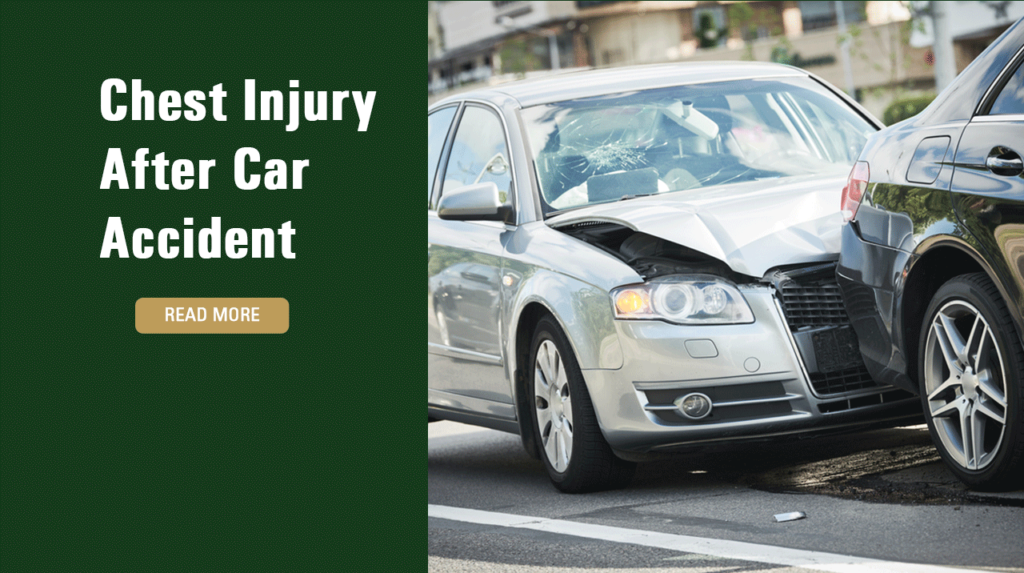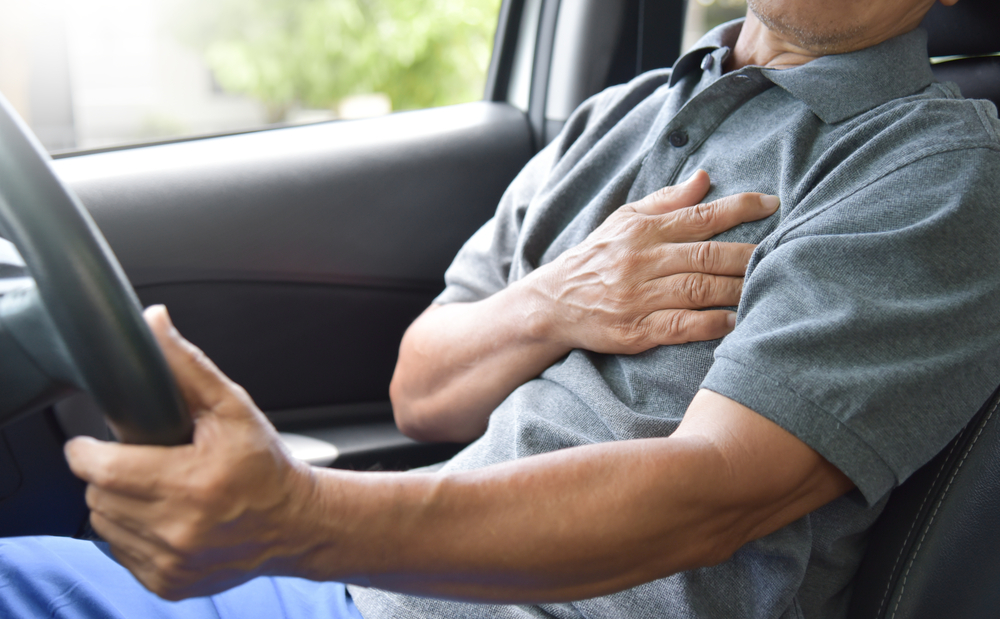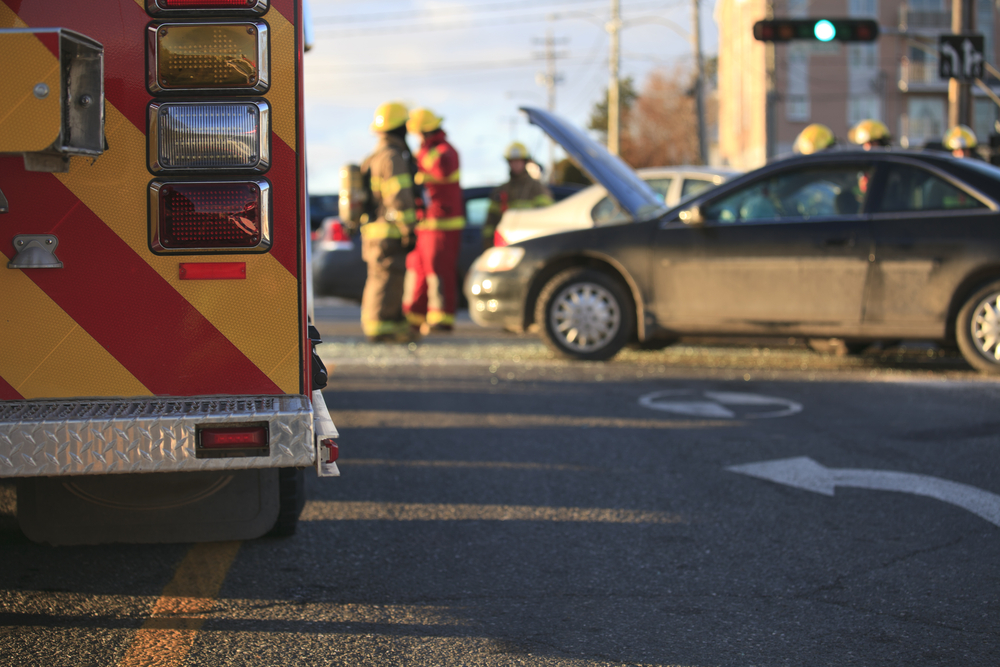Chest Injury After Car Accident

A motor vehicle collision can cause many different types of injuries. While some car accidents only involve property damage, many others result in serious injuries. Thoracic or chest injuries are fairly common in car wrecks. A Philadelphia car accident attorney can advocate for you when you have sustained injuries in a crash caused by someone else. If you have suffered an injury to your chest in a Pennsylvania car accident, here is what you need to know from the attorneys at the Philadelphia law firm of Raynes & Lawn.
How Chest Injuries Can Occur in Car Accidents
Many people experience chest pains following car crashes. The pain and injuries are commonly caused by the following things:
- Airbags
- Impact with steering wheels
- Seatbelts
While seatbelts can cause injuries to your chest in a car wreck, they also can help to prevent you from suffering more serious injuries or dying in a crash. Make sure to always wear your seatbelt whenever you ride in a vehicle to protect yourself.
Seatbelts sometimes cause injuries when they lock up to keep you in place during an accident. The locking mechanism helps to prevent you from being thrown forward or around inside your vehicle. Since they are made of strong polyester, they can sometimes cause bruising and soft tissue damage to your shoulders, ribs, and chest.
Similarly, airbags can also cause chest injuries. A properly working airbag should deploy in a crash as a safety device. However, while an airbag can keep you from going through the windshield or side window and impacting the dashboard or door, you can still suffer chest injuries and burns when you impact an airbag because of the suddenness of their release.
Drivers can also suffer chest injuries by impacting their steering wheels during a crash. Typically, a driver who impacts the steering wheel might suffer fractured ribs, which can cause sharp chest pains.

Common Types of Chest Injuries in Motor Vehicle Collisions
The following are the most common types of chest injuries people can suffer in motor vehicle collisions:
- Bruising
- Soft tissue damage
- Organ damage
- Internal bleeding
- Fractured or bruised ribs
You might not initially notice some of these injuries. This makes it important for you to see a doctor anytime you have been involved in an accident to get an accurate diagnosis of your injuries, including those with delayed symptoms. Below are some of the symptoms you might experience with different accident-related chest injuries.
Rib Fractures
If one or more of your ribs is broken in a car wreck, you will experience immediate symptoms. Rib fractures cause shooting and sharp pains and commonly happen when drivers impact the steering wheel in an accident.
Sternum and Rib Bruising
In some cases, drivers who hit their steering wheels will not suffer bone fractures but might instead suffer bruising to their sternum and ribs. If your sternum is bruised, you might experience intermittent, aching, and dull pains when you breathe.
Strained Muscles
If you strain your chest muscles in a car accident, you will likely experience aching, dull chest pains. Even if you think you only strained your chest muscles, you should still see a doctor and make sure that you don’t have a more serious injury.
Damage to Internal Organs
The most serious type of chest injury that you might suffer in a car accident is damage to your internal organs, including your lungs or heart. If you suffer this type of injury, it could be life-threatening. Injuries to your lungs and heart could lead to a heart attack. You should seek medical attention immediately when you experience chest pains.
Other symptoms you might experience from injuries to your chest include dizziness, shortness of breath, and fatigue.

Steps to Take For Chest Pains Following a Car Wreck
If you are experiencing chest pains following a car crash, you should take these steps.
1. See a doctor immediately.
When you experience chest pains, it is important to see a doctor immediately to get a diagnosis of your injuries. Seeking immediate medical attention could save your life or help you rule out serious conditions. The sooner that you see a doctor, the faster you can get treatment and recover.
2. Get Diagnostic Imaging.
When you see your doctor, you will likely receive a referral for diagnostic imaging tests. Make sure you complete these tests to help ensure a proper diagnosis. Your doctor will likely request a CT scan to get a detailed picture of your chest to pinpoint your injuries and determine the most appropriate treatment.
3. Keep all Appointments for Follow-Up Care.
Make sure to follow your doctor’s recommendations, and keep all of the follow-up appointments. Gather and retain documentation of your medical care related to your chest injuries, including documentation from the emergency department, your primary care doctor, specialists, and others who provide you with treatment. Getting this type of documentation can help you when you file a claim with the other motorist’s insurance company by showing evidence that your injuries were caused by the accident instead of something else. Insurance companies typically look at how soon after an accident someone sought treatment. If you wait for some time to pass before you seek treatment, it could be more difficult for you to recover full compensation for your injuries and related losses.
Similarly, if you don’t follow your doctor’s recommendations for follow-up care, the insurance company might argue that your injuries are not as severe as you have claimed. By keeping all of your medical appointments and saving your medical documentation, you can help your car accident lawyer in Philadelphia pursue compensation on your behalf.
4. Don’t Give a Statement to the Other Driver’s Insurance Company.
After your wreck, you might be contacted by a representative from the other driver’s insurance company. The representative might ask you about your injuries and the accident. You should not agree to talk about your accident or injuries with the other motorist’s insurance company, however. Insurance companies typically try to get accident victims to give them statements so that they can use what they say against them during the claims process. You don’t have a legal obligation to talk to the other motorist’s insurance company since you do not have a contract with them.
5. Don’t Sign Anything From the Insurance Company.
The insurance company might send you a medical authorization form and tell you that your claim can’t be processed until the company can confirm the severity and nature of your injuries. Do not sign this form. The insurance company will instead likely use it to search through your entire medical history to try to claim that your injuries were caused by something other than your accident. Similarly, you might receive an early settlement offer. If you do, don’t sign it until you have had it reviewed by an experienced attorney at Raynes & Lawn. Early settlement offers are often far lower than the actual value of accident claims. If you are asked to sign something, tell the insurance company you want to speak to a lawyer first.
Talk to a Car Accident Lawyer in Philadelphia
Following a car accident, you have a limited time to file a lawsuit in Pennsylvania. This time limit is established by the state’s personal injury statute of limitations and is two years from the date of your accident. Instead of waiting until the limitations period is almost expired, it is better for you to reach out to a lawyer as soon as you can after your collision. Witnesses and evidence can be lost when too much time passes. There are also certain types of situations in which the statute of limitations might be shorter, including if the at-fault motorist was driving for their job at the time of your accident as a local, state, or government employee.
If you have sustained chest injuries in a motor vehicle collision, you should reach out to a Philadelphia car accident attorney at Raynes & Lawn. We have represented accident victims for more than five decades and can provide you with an honest evaluation of your potential claim. Call us today for a free consultation at 1-800-535-1797.

For the general public: This Blog/Website is made available by the law firm publisher, Raynes & Lawn, for educational purposes. It provides general information and a general understanding of the law but does not provide specific legal advice. By using this site, commenting on posts, or sending inquiries through the site or contact email, you confirm that there is no attorney-client relationship between you and the Blog/Website publisher. The Blog/Website should not be used as a substitute for competent legal advice from a licensed attorney in your jurisdiction.
For attorneys: This Blog/Website is informational in nature and is not a substitute for legal research or a consultation on specific matters pertaining to your clients. Due to the dynamic nature of legal doctrines, what might be accurate one day may be inaccurate the next. As such, the contents of this blog must not be relied upon as a basis for arguments to a court or for your advice to clients without, again, further research or a consultation with our professionals.